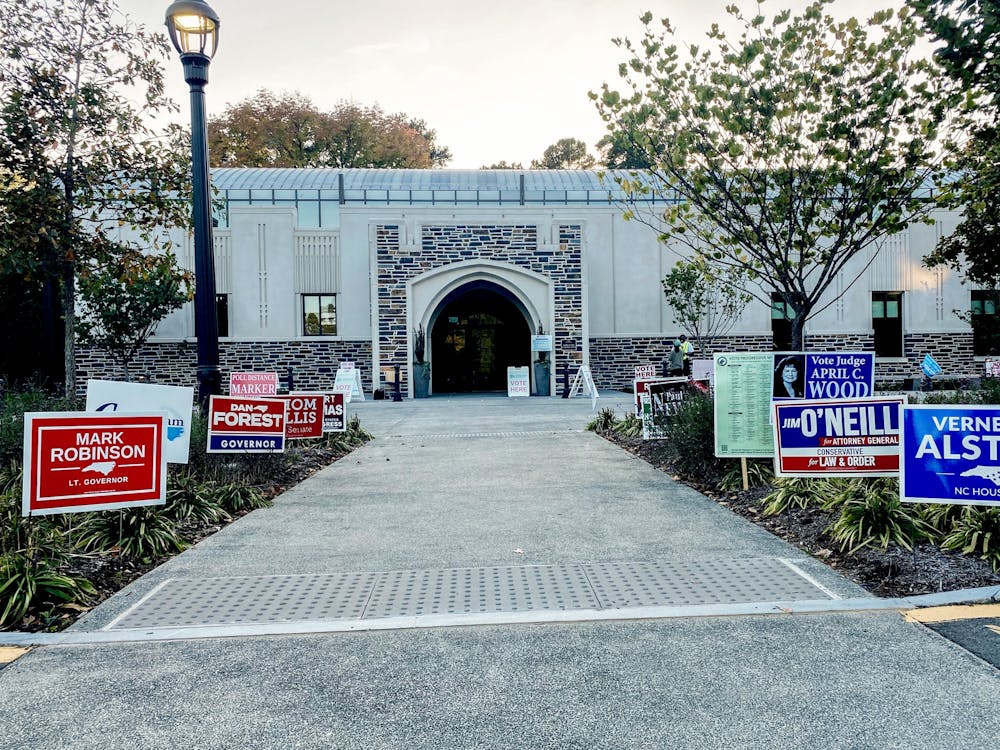For more election coverage from across North Carolina, visit One Vote N.C., a collaborative between The Chronicle and six other student newspapers that aims to help college students across the state navigate the November election.
With Tuesday’s presidential election quickly approaching, Duke students are apprehensive about what the results—or lack thereof—could mean for the nation, even as they try to have the best outlook possible.
Some students are concerned about a delay to election results after Tuesday night due to this year’s record number of mail-in votes. Regardless of their preferred candidate, some anticipate widespread unrest or even violence among supporters of the losing candidate. Still, students will come into election night with some degree of hope for change and excitement to see who will be elected president.
“It’s an important election, but at the end of the day life goes on,” sophomore Alec Morlote said.
Morlote continued that he is “not putting too much stock in how it’s going to affect my life,” noting he is mostly excited to see whether Trump will win a second term or whether Biden will prove the polls correct. Reflecting on the past four years, Morlote said that “there’s been a lot of social unrest in this country” but that he believes the economy was performing strongly prior to the COVID-19 pandemic.
He said that with a Trump victory, there could be protesting and rioting in cities “probably to a greater degree than what we’ve seen before,” adding that “there will likely be lives lost.”
“We don’t have the novelty of Trump like we did in 2016, but we still have a lot of the showmanship and rhetoric,” junior Frankie Pucci said.
Regarding the presidential debates, Pucci said, “We knew Trump was probably going to be interrupting people,” but that the incumbent president seems to have listened to his campaign team’s advice and appeared more civil in the second debate. However, Pucci said that he felt “neither debate did anything to sway voters.”
Prior to the coronavirus pandemic, Pucci thought he had a good idea about what the election’s outcome would be, but now he doesn’t think people have “any kind of idea about how this election is going to go,” he said.
“My biggest fear is that if Trump loses, he won’t concede the election,” Pucci said. He expressed some degree of optimism that the current president would be willing to leave the White House, but recognized that Trump could “always be a bit of a wild card.”
Pucci, who voted for Joe Biden, said he hopes this year’s massive early voting turnout will allow the election to be decided by Tuesday night. He hopes that Trump “doesn’t win again and that we can move forward from a tumultuous era.”
Sophomore Dorothy Zhan said that she feels “very anxious” and “kind of overwhelmed with the amount and volume of news” about the election.
She said that she is glad to see more and more voters participating in the electoral process and being aware of national events, but remarked that “there’s a lot of hatred and anger and bitterness” surrounding the current political climate.
In contrast to the 2016 election, when she was not yet of voting age, she said, “Now that I do have a voice, I’m a lot more aware. It’s very empowering.”
Zhan expressed concern about how long election results will take to be officially decided. She said she was afraid of the conversations that will ensue, as “there’s just a lot of opinions.” Even now when she discusses the election with friends, “we’re agreeing but it feels and sounds combative,” Zhan said.
“As a woman of color, I just don’t think that Trump cares,” Zhan said, sharing that she had decided to vote for Biden.
Senior Fikemi Faleye said that she feels “very nervous” and “apprehensive because it’s such an important election,” referring to both the presidential and Congressional races. She said that it will likely be a contested and “a very drawn out process,”
Regarding the past four years of the Trump presidency, Faleye said that “nothing has been irreplaceably broken.” What has changed in her opinion is that it’s “no longer acceptable to remain neutral,” as voters are seemingly forced to choose sides.
Her biggest hope is for “nothing to be contestable,” although there is “a lot of uncertainty,” as the election’s outcome may not be known for weeks.
Similar to Morlote, sophomore Eliot Merriner said that he doesn’t think this election will be “make it or break it for America.”
“A lot of people think the country will be in ruin., I don’t think that will be the case,” he said.
Merriner remarked that it is “pretty saddening to see how divided people get,” as major parties choose to focus on their differences rather than their similarities. He reflected on positive economic change in the past four years, and said that his “biggest hope is that Trump gets elected.”
“My biggest fear isn’t that Biden would get elected, but that things get much worse before they get better,” he continued, referring to the current state of political polarization.
But “regardless of who gets elected, there’s going to be violence either way,” he said, deeming the election a “a no-win situation for our country.”
Although Merriner does think that things will improve for the country, he does not know when.
“We have a long way to go before our country is out of the tunnel with division and conflict,” he said.
Get The Chronicle straight to your inbox
Signup for our weekly newsletter. Cancel at any time.

Parker Harris is a Trinity senior and an editor at large of The Chronicle's 118th volume.

